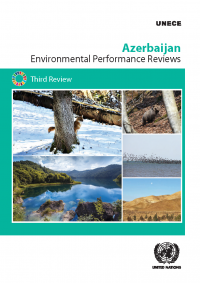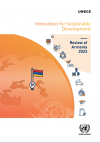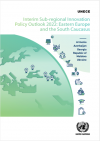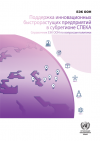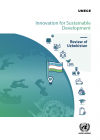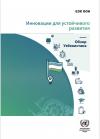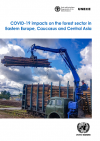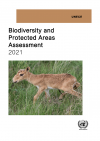Publications
Displaying Results 1 - 20 of 27
- English
The third Environmental Performance Review (EPR) of Kyrgyzstan builds on the substantial experience accumulated by the Economic Commission for Europe (ECE) and its member States in using the EPR tool to regularly assess progress achieved in reconciling national economic and environmental objectives. The third EPR of Kyrgyzstan takes stock of progress made in the governance and management of the
- English
Innovation – or the systematic experimentation with new ideas – is essential for the sustained economic growth and enhanced competitiveness of the seven countries of the United Nations Special Programme for the Economies of Central Asia (SPECA), i.e., Afghanistan, Azerbaijan, Kazakhstan, Kyrgyzstan, Tajikistan, Turkmenistan and Uzbekistan, to achieve sustainable development in line with the UN
- English
The third EPR of Azerbaijan takes stock of progress made in the governance and management of the environment since the second review in 2011, assesses the implementation of the recommendations of that review and makes new recommendations for the country to implement. In addition, the third EPR looks into developments related to the country’s attainment of relevant targets of the 2030 Agenda for
- English
Since its independence in 1991, Armenia has been making significant strides towards innovation-led sustainable development. Despite the hurdles Armenia has faced, including regional instability and the global COVID-19 pandemic, the country has managed to maintain a competitive information and communication technology (ICT) sector while fostering an energetic entrepreneurial scene. The success of
- Pусский
Пандемия COVID-19 и война на Украине негативно сказались на экономическом развитии стран-членов ЕЭК ООН, значительно нарушив международную торговлю, инвестиции и сотрудничество. Из-за своего географического положения и стадии развития эти удары особенно сильно повлияли на страны с переходной экономикой, такие, как страны Восточной Европы и Южного Кавказа (ВЕСК) – Армению, Азербайджан, Грузию,
- English
The COVID-19 pandemic and the war in Ukraine have negatively affected economic development in UNECE member States, significantly disrupting international trade, investment and cooperation. Because of their geographical location and development stage, these shocks have hit especially hard in transition economies in Eastern Europe and the South Caucasus (EESC) – Armenia, Azerbaijan, Georgia, the
- English
Public procurement represents 10 per cent of Georgia’s GDP. Therefore, innovation-enhancing procurement (IEP) can be a powerful policy lever to catalyze innovation and promote sustainability. Using public procurement to drive innovation was one of the recommendations of the
- Pусский
Регион ЕЭК ООН, включая государства-участники Специальной программы Организации Объединенных Наций для экономики стран Центральной Азии (СПЕКА), в последнее время сталкивается с рядом проблем, включая пандемию COVID-19 и последовавший за ней экономический спад, последствия военных действий на Украине, а также тройной планетарный кризис - изменение климата, потеря биоразнообразия и
- English
The UNECE region, including the participating countries of the United Nations Special Programme for the Economies of Central Asia (SPECA), have recently faced a number of challenges, such as the COVID-19 pandemic and resulting economic downturn, the impact of military conflict in Ukraine, and the triple planetary crisis of climate change, biodiversity loss and pollution. This has negatively
- English
This report highlights the main results of an assessment of the water-food-energy-ecosystems nexus in the North-Western Sahara Aquifer System (NWSAS), shared by Algeria, Libya and Tunisia. The aquifer system is one of the largest transboundary groundwater reserves of North Africa, extending over one million square kilometers and subject to increased water demands. Improving the management of the
- English
Fourth cycle of EPRs: advancing environmental performance in the region and beyond. Transforming Planet.
This calendar promotes the fourth cycle of UNECE EPRs, based on the document adopted by the Committee on Environmental Policy and subsequent decisions made, as well as ministerial decisions.
Three EPR cycles have already taken place. Printed copies of EPR publications may be
- English
- English
Uzbekistan has made important recent progress in liberalizing its economy for trade and investment, spurring economic growth and creating significant reform momentum for sustainable development and the transition towards a circular economy, in line with United Nations Agenda 2030. Innovation plays an important role in these efforts, as it is essential to building a competitive economy and
- Pусский
В последние годы Узбекистан добился значительного прогресса в осуществлении внутренних реформ, направленных на открытие экономики для торговли и инвестиций, стимулирование экономического роста и повышения конкурентоспособности в целях устойчивого развития и перехода к экономике замкнутого цикла в соответствии с Повесткой дня Организации Объединенных Наций на период до 2030 года. Инновации играют
- English
This report summarizes the impacts that the COVID-19 pandemic had during 2020 in the forest sector of the countries in Eastern Europe, the Caucasus and Central Asia (EECCA) (Armenia, Azerbaijan, Belarus, Georgia, Kazakhstan, Kyrgyzstan, Moldova, Russian Federation, Tajikistan, Turkmenistan, Ukraine and Uzbekistan), focusing on production, export, import, consumption, prices and employment for the
- Pусский
Являясь инструментом инновационной политики, бизнес-инкубаторы (БИ) обладают большим потенциалом для стимулирования инновационного предпринимательства за счет предоставления стимулов, обеспечения поддержки, налаживания связей и создания благоприятных условий для людей, которые хотят разрабатывать и опробовать новые идеи. Экспериментирование с идеями в целях создания стоимости и более
- English
This handbook covers the key steps and considerations to set up, run, and evaluate business incubation programmes. Section 1 outlines the defining characteristics of BIs and their effectiveness in transition economies. Section 2 describes the stages of business incubator creation, namely: BI feasibility assessments based on environmental factors; setting the goals that determine the type or model
- English
This study summarizes the key findings of the ninth study, which focuses on Serbia. It was carried out pursuant to the Government’s request to support ongoing efforts to increase the trade sector’s contribution to development and the implementation of the 2030 sustainable development goals (SDGs). The study was prepared by the UNECE secretariat in close consultation with public and private-sector
- English
This assessment was conducted between 18 June 2020 and 3 June 2021 with the objective of analyzing the developments and challenges in the management of biodiversity and protected areas (PAs) in 14 countries that carried out and completed a ECE Environmental Performance Review (EPR) under its 3rd cycle (further 3EPR) since 2014. This includes Albania (2018), Belarus (2016), Bosnia and Herzegovina
- English
Innovation is central to the United Nations 2030 Agenda for Sustainable Development and to economic development across the world. One of the most open and democratic countries in the region, with a strategic location, educated work force, strong legacy of applied research, competitive wage levels, ample natural resources, and vibrant and growing links with the neighbouring region,


